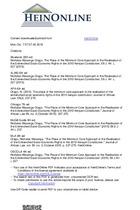| dc.description.abstract | The high levels of poverty, inequality and socio-economic marginalisation that bedevilled Kenya for generations led to a struggle for a new constitutional dispensation, which culminated in the promulgation of a new, egalitarian and transformative constitution in August 2010. This constitution entrenched justiciable socio-economic rights within an elaborate Bill of Rights. Though an important step in the process of the egalitarian transformation of the country, the challenge remains to transform these precepts into practice with their scrupulous implementation through legislative, policy and programmatic frameworks, as well as judicial decision-making. This article argues that, in order to achieve the intended egalitarian transformation, Kenya must adopt a strong interpretive approach, with sufficient foundational standards for the translation of these rights into tangible realities for Kenyans. Kenya must therefore explicitly adopt a minimum core approach for the realisation of these rights to transform them into practical realities for the poor, vulnerable and marginalised Kenyans. | en_US |

